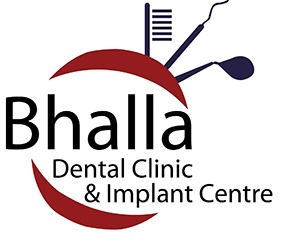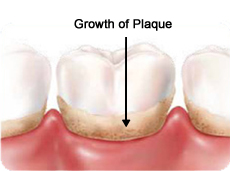Dental Plaque is a thin, greasy and dark yellowish film of bacteria and mucus that sticks to teeth surface & gum line and then further advances in wearing of teeth, contributing to even serious oral problems, if left unclean.
How is plaque deposited on teeth?
The teeth are mainly layered with proteins (pellicles), which contributes to specific touch and slipperiness that we feel on them. With our foodstuff full in carbohydrates (sweetness or sourness) sticking onto the teeth and then not being cleaned regularly, there would be a solid bacterial deposition on them, colonizing in big numbers and growing into a biofilm (tooth coated with bacterial spread) to this point.
Biofilm in its lower stages can be removed easily. However after approximately two days or more, it will start becoming stubborn on teeth and around 10 or 12 days later, it will glue on teeth too tightly to be able to remove even with the fingernails.
The plaque will now combine with minerals & other nourishing substances out of saliva & nutrients from food particles, which in turn will develop bacteria in great strength & amounts, solidifying the plaque formation much thicker and tougher. Plaque growth varies in composition and thickness, differentiating in types of bacteria and extents of depositions they have on teeth.
How does Dental Plaque affect our Oral Health?
A degree of plaque formation entirely depends upon the rate of sweetness and sourness the teeth are formed with and all at once the plaque formed with thousand types of bacteria invaded on with different sorts of impacts they leave upon. Greater or lesser degree of such attributes defines the deterioration of one’s oral health.
If Plaque Remained Untreated, It Would Lead To:
- Dental Calculus or Tartar: Plaque hardened up on the teeth and gum line makes dental tartar or calculus. Teeth tartar cannot be brushed off but would only require your dentist’s help to be removed.
- Bad Breath: Plaque formation on teeth will make one feel furry with the tongue touching it and often smelly while talking to others.
- Gum Bleeding (Gingival Bleeding): An accumulation of hardened layer of tartar on gum line leads to an infection & inflammation of gums (gingivitis), affecting the tissues at depth of gum space found between the tooth and the gum tissues.
- Periodontal Diseases: Dental plaque can mainly strike on tooth surface, wearing and tearing the tissues of teeth (tooth enamels) especially due to acid formed on them leading to gum diseases like painful gums, disrupted teeth-bite patterns and other periodontal abnormalities.
- Tooth Loss: Plaque is also extended up to the teeth root & gummy tissues, more likely affecting the jawbone that normally supports the teeth structure. Any little damage, if abandoned untreated, can further push the oral health to be deteriorated deadly with pulpitis, tooth eruption and, even in worst case, a total tooth loss.
In addition to oral problems, plaque formation can often lead to several other physical irregularities such as stomachache (indigestion), cardiac problems (leading to blood clots due to plaque deposition) and many others. The scientific survey says that the people with periodontal diseases would always have more likelihood of getting cardiac problems than those with good oral health.
How Can Plaque Formation Be Prevented?
- At the outset, to avoid plaque deposition onto the teeth, brush the teeth at least two times a day with a brush soft bristled and a proper brushing technique. This can definitely force your plaque formation to be stopped or removed completely. Use toothpaste sufficient in fluoride as well
- Keep removing food particles stuck between and on the teeth at least once a day. Avoid eating sticky, sugary, starchy diet (e.g. soft drink, cakes, chocolates or candies), which can leave plaque on teeth quickly and excessively)
- Use mouth gargles to cleanse oral cavities and teeth surfaces in order to control or get rid of bacterial invasion through
- Eat nutritious & balanced food (e.g. some vegetables will help in eliminating the food jammed in between the teeth and help saliva to defuse the effect of acids produced as well)
Most importantly, seeing your dentist or periodontist at a regular interval and having your teeth checked up and cleaned is an ever ideal option to keep such problems away and your oral health untouched, without any dental problems!





